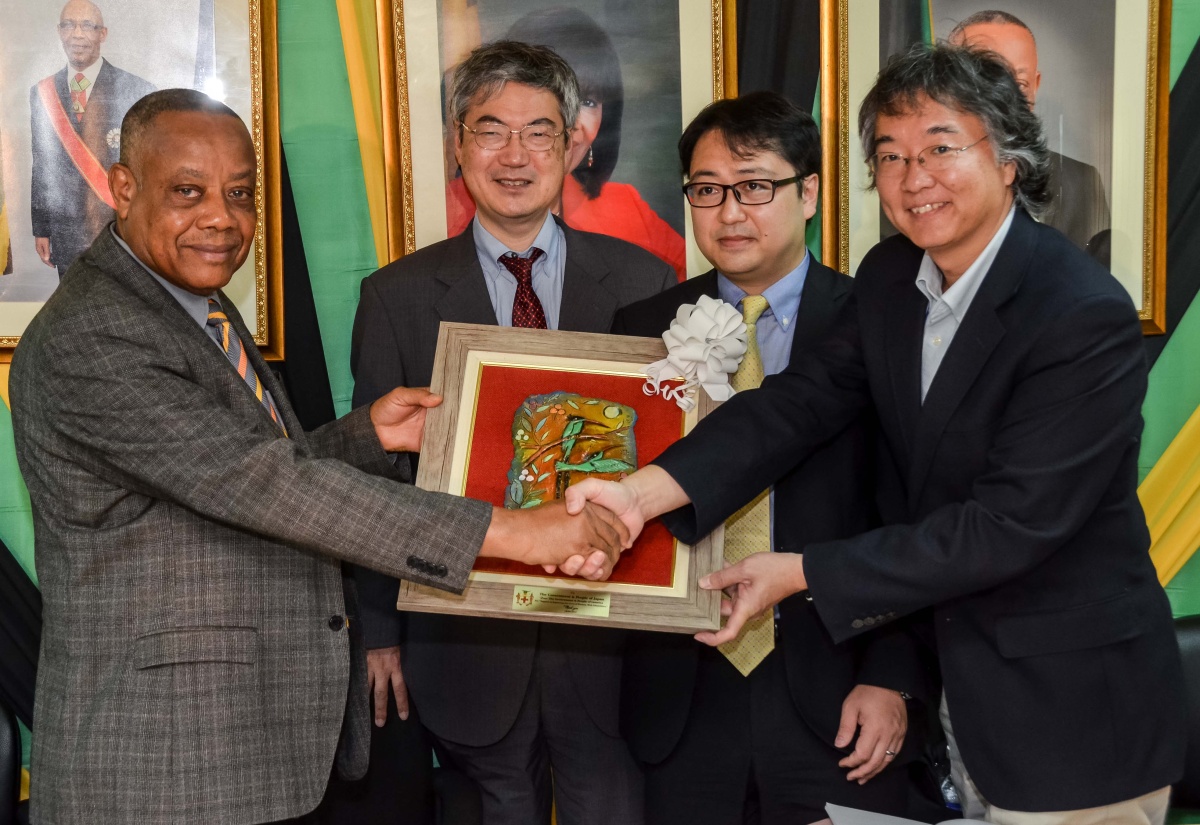Japan impressed with execution of project to assist disabled persons
By: , June 20, 2015The Key Point:
The Facts
- The team is on a two-day visit to the island, from June 18 to 19, to review the performance of the project and conduct site visits at the Jamaica Council for Persons with Disabilities (JCPD) and the Early Stimulation Programme (ESP)
- The Japanese Government donated US$572,000, while the Jamaican Government contributed US$160,800 in resources for a total amount of US$732,800.
The Full Story
The Government has received commendation from Japan for the successful implementation of the Disabilities Technical Cooperation Project partly funded by the Asian country.
Deputy Director, Ministry of Finance in Japan, Nobuyuki Imamura, praised the efforts of the Ministry of Labour and Social Security in implementing the project, aimed at improving the lives of disabled Jamaicans, and pledged support for future such collaborations.
“Going forward, we at the Ministry of Finance would like to cooperate in the next project. We would like to see very heavy involvement from (the) Japan International Cooperation Agency (JICA) so that we can make a productive and collaborative project,” he said.
Mr. Imamura was speaking during a courtesy call by Members of the Japanese Funds Special Monitoring Mission at the Ministry’s North Street offices yesterday
(June 18).
The team is on a two-day visit to the island, from June 18 to 19, to review the performance of the project and conduct site visits at the Jamaica Council for Persons with Disabilities (JCPD) and the Early Stimulation Programme (ESP).
The Government implemented the Disabilities Technical Cooperation Project in 2011, in collaboration with the Inter-American Development Bank (IDB) and through funding from the Japan Social Development Fund.
The aim was to assist the Ministry to improve the framework to advance social protection policies that will impact on the welfare of persons with disabilities (PWDs).
The Japanese Government donated US$572,000, while the Jamaican Government contributed US$160,800 in resources for a total amount of US$732,800.
There were five components under the project including the development of the registration programme for PWDs through the establishment of a new Management Information System; increasing public education and promotion; research, institutional strengthening and training; and improvement to the Early Stimulation Programme (ESP) for children with disabilities.
Principal Technical Lead and Inter-American Development Bank (IDB) representative from Japan, Kazushige Taniguchi, also had high commendations for the Jamaican team.
“We are very much impressed because as a donor from Japan and also the IDB, as a Manager of the trust fund we are very much interested with how the money is being implemented and how our technical assistance is implemented and how that affects the beneficiaries. We saw a very nice combination of the work with the Government and the team at the project sites…and we thank you,” he said.
Minister Kellier thanked the Japanese Government and the IDB for the assistance provided to PWDs.
“My Ministry and, by extension, the country have accomplished much over the years and we are tremendously grateful for the extensions provided, which have enabled us to implement this project,” he said.
The Social Security Minister added that the prospect for future collaboration is welcome as Jamaica would benefit significantly from the expertise of the Japanese.
“We are now looking forward to the next steps and would welcome opportunities to discuss continued collaboration and joint partnership with the Japanese Government. There can be benefits from technical exchanges from the Japan International Cooperation Agency programme, of which we are already benefitting at the Jamaica Productivity Centre,’ he said.
ESP’s Executive Director, Antonica Gunter Gayle, also expressed her gratitude for the support received through the project and the positive impact that it has had on the special needs institution.
“I really appreciate this well-needed assistance. It has impacted our families of children with disabilities, the community, the teachers and the children and how they learn and the stimulation and the intervention that are taking place. The programme has touched many lives and it is our aim to include these children in our society,” she said.
For her part, JCPD’s Executive Director, Christine Hendricks, noted that the project has helped her agency to better plan for PWDs through the implementation of several initiatives.
“It had enhanced our capacity to register PWDs and to better understand the characteristics needed to profile PWDs. Out of this project, we have [also] been able to carry out a mass registration of PWDs. For the first time, we have a MIS that has been created specifically with data that will be utilised for further research and also for developmental planning,” she said.
Ms. Hendricks said the project has facilitated “much-needed” public awareness and education about disabilities and about the importance of the registration process.
“Out of the project, we also have a three-year communication plan, which is intent on strategically penetrating society with information about disabilities so that the stigma and misperceptions can decrease about PWDs, and as society understands more, society will begin to include them more,” she noted.


